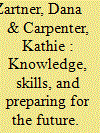|
|
|
Sort Order |
|
|
|
Items / Page
|
|
|
|
|
|
|
| Srl | Item |
| 1 |
ID:
164151


|
|
|
|
|
| Summary/Abstract |
The practice of dispatching teams of police advisors to other states to build or train foreign security forces began at the end of the nineteenth century, yet there exists no definitive history of the practice, or any definitive theoretical approach underpinning why such missions succeed or fail. Drawing upon their recent edited book on expeditionary police advising, and by examining the donor or sending states, the host nations, and the use of police in counterinsurgency situations, the authors present some key reasons why such missions fail, and lay some groundwork for additional study of this important subject.
|
|
|
|
|
|
|
|
|
|
|
|
|
|
|
|
| 2 |
ID:
159417


|
|
|
|
|
| Summary/Abstract |
Higher education is at a point of transition. Colleges and universities are considering new ways to attract students through innovative programs that stay true to their educational mission and also prepare students for the current job market. Employers consistently talk about the skills they need in graduates they hire, including critical thinking, strong writing, adaptability, and cultural competency. International studies as a major is perfectly poised to provide students with both the academic grounding they need to better understand the world around them and the skills necessary to make them desirable to employers. Communicating the skills and content that coursework in the major offers, however, is often not a straightforward process. Students have both skills and content knowledge, but two key issues need to be addressed: (1) how can faculty better communicate to students the skills and knowledge we want them to gain from our classes, and (2) how do we enable students to understand and articulate these skills to future employers? This article addresses these questions by examining the contributions of international studies with regard to building skills in the classroom, enhancing cultural competency, promoting language training, developing networking capacity, and preparing students for life after college.
|
|
|
|
|
|
|
|
|
|
|
|
|
|
|
|
| 3 |
ID:
158005


|
|
|
|
|
| Summary/Abstract |
After 15 years of war in Afghanistan and Iraq, many now see ‘small-footprint’ security force assistance (SFA) – training, advising and equipping allied militaries – as an alternative to large US ground-force commitments. Yet, its actual military efficacy has been little studied. This paper seeks to fill this gap. We find important limitations on SFA’s military utility, stemming from agency problems arising from systematic interest misalignment between the US and its typical partners. SFA’s achievable upper bound is modest and attainable only if US policy is intrusive and conditional, which it rarely is. For SFA, small footprints will usually mean small payoffs.
|
|
|
|
|
|
|
|
|
|
|
|
|
|
|
|
|
|
|
|
|